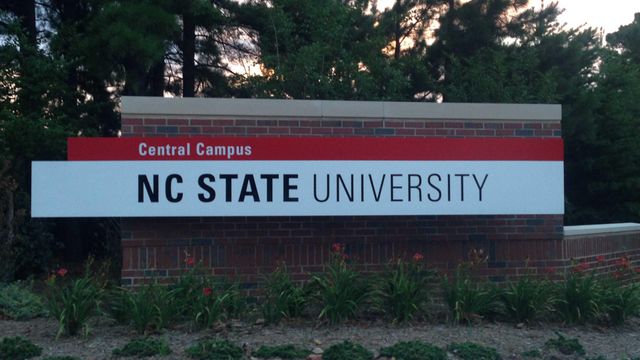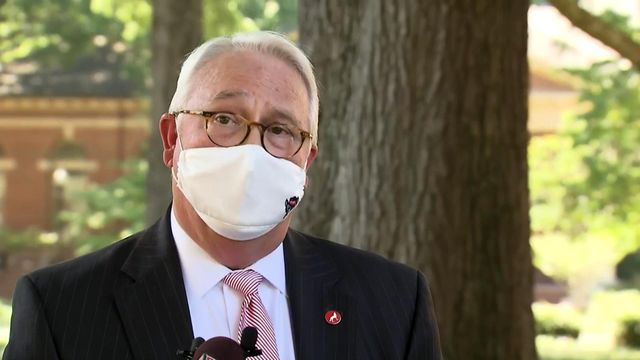Amid spread of coronavirus on campus, NCSU tells students to move out of dorms
North Carolina State University officials said Wednesday that they want students to leave on-campus housing over the next 11 days as the number of clusters of coronavirus cases on campus continues to grow.
Posted — UpdatedChancellor Randy Woodson said more than 900 students were in isolation or quarantine on and off campus, and the spread of the virus has been "unrelenting."
"We've seen far too much evidence of growth and spread of the virus in on-campus residential halls," Woodson said at a news conference. "It's clear that we're not going to be able to meet the required social distancing guidelines and be able to keep our students safe and healthy on campus."
The university is scheduling appointments for students to move out, starting Thursday and running through Sept. 6, to ensure the moves can be accomplished with social distancing.
About 6,500 students now live on campus, Woodson said, and officials want to get down to about 2,000 students on campus, so each student would have his or her own bedroom and bathroom.
Students can apply for a waiver to remain on campus if, for example, they have people in their homes who are at higher risk from the virus, going home presents travel difficulties, they don't have internet access at home or have a financial hardship.
"We have a number of students who have no place to go," Raleigh Mayor Mary-Ann Baldwin said. "I think people would be surprised at the number or percentage of students at our universities who are housing insecure, who are food insecure. These young people need a safe place to be."
Woodson said he expects some backlash from the move.
"Our students want to be here. Our parents want our students to be here. But they expect us to create an environment where they can be safe," he said. "That's our No. 1 priority, and as I said, it's become untenable to provide on-campus housing and meet that threshold of health and safety."
He declined to point fingers at anyone for the rapid spread of the virus, but he noted that it started with off-campus activities and in off-campus housing and that there has been no spread because of in-person classes or research conducted on campus.
"I think what all of us in higher education have come to appreciate is how unforgiving this virus is among a young population," he said. "At the end of the day, the folks that have been involved in that [risky] activity ... will have to live with that, those decisions."
Baldwin agreed that assigning blame for the outbreak at N.C. State would be wrong.
"That is what 18- to 21-year-olds do, and unfortunately, we have seen the result of that," Baldwin said. "I know that some people have blamed the students. I am not going to blame the students. I think that is what young people do – a different perspective on the world – but now, I think, they also see the consequences."
But Mayor Pro Tem Corey Branch noted that Raleigh has had to cancel events through the end of the year because of the threat posed by the virus and that students also should look at the big picture before partying and risking spreading the virus.
"We need people to care about each other. When you care about each other, you don’t put yourself in situations where you can hurt and harm others," Branch said. "I think a lot of these clusters have come from parties and events and large gatherings. I mean, I know they miss seeing each other, but let’s pause for the greater good and long term.”
"Where I live [and] in a lot of the residence halls, we have been very vigilant about staying safe," Gyll said, adding that others on and off campus haven't.
Students in quarantine or isolation on campus must be cleared by Student Health Services before moving out, and they will be advised to quarantine themselves for 14 days in their new location.
Students who do move out will receive prorated refunds for unused portions of housing and dining payments for the fall semester.
With housing and dining revenue severely reduced, Woodson said some N.C. State workers will be furloughed.
Friday also is the last day for students to withdraw from fall semester classes and receive refunds on most of their tuition, but not many students are doing so, he said.
"The vast majority of our students are sticking with higher education and trying to get through this virus like all of us are every day," he said.
Related Topics
• Credits
Copyright 2024 by Capitol Broadcasting Company. All rights reserved. This material may not be published, broadcast, rewritten or redistributed.






